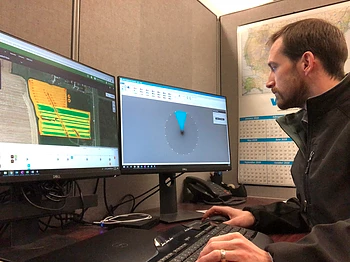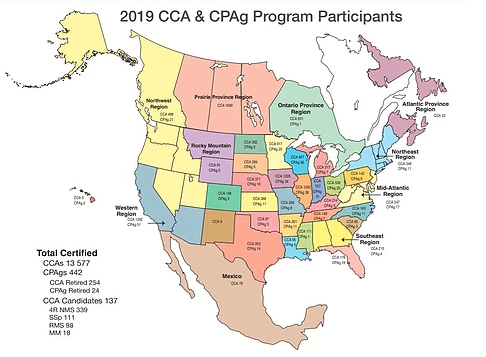Source: Precision Ag Reviews
As in all fields, technology in the agriculture industry is advancing at ever-increasing speeds. It can be hard to keep up with the constant software updates, numerous startups approaching farmers and businesses, and the frequent release of new products. While large farms may be able to hire someone with the technical skills to manage data, create prescriptions, and troubleshoot technology issues, this is often not an option for all farms. Fortunately, a new certification program for agronomy consultants is hoping to solve this problem by equipping agronomists with the technological skills needed to provide further value for farmers.

The American Society of Agronomy (ASA) was founded in 1907 to help agricultural practitioners stay current on the latest advancements in agronomy and crop management. In 1992, the ASA launched the Certified Crop Adviser (CCA) program. The CCA program is voluntary and allows agronomists and other consultants to demonstrate their professionalism, dedication to their practice, and understanding of agronomic principles by passing knowledge exams and pursuing continuing education.
For decades the certification programs offered by the American Society of Agronomy remained relatively unchanged. Prospective CCAs were required to take and pass an international exam that tested their knowledge of basic agronomic principles and a state exam on local agricultural systems such as soils, pests, and crops specific to their region. After passing the exams, prospective CCAs would submit an application detailing their education history, professional experience, and references that could speak to their agricultural knowledge. Once certified, CCAs would remain current by attending educational events that offer continuing education units (CEUs).
However, as the agriculture industry has changed with the proliferation of new technology and increased focus on sustainability, the American Society of Agronomy has evolved to meet these needs. This includes offering several additional certifications that existing CCAs can pursue. Among these is a new program launched in early 2019 for CCAs to become certified Precision Agriculture Specialists (PASp).
The PASp certification designates that a CCA understands current technologies and trends particular to precision agriculture practices. This includes knowledge of systems such as yield monitors, GPS, remote sensing, and software tools used to create variable rate prescriptions, among others. To become a PASp, the applicant must be a current CCA and pass the PASp exam offered by the American Society of Agronomy.
The fact that all PASps are all certified crop advisors is just one of several advantages of working with them.
“As a farmer, you have no way to know if a consultant is qualified,” Luther Smith, Director of Certification and Licensing for the American Society of Agronomy said.
However, by working with a CCA who is also a PASp, you know that they have met certain standards as set by the ASA.
“We put candidates through more rigorous background checks on experience and education than the typical employer,” Smith said.
In other words, certified consultants truly are experts in their field.

Photo Credit: Precision Ag Reviews
In total, there are 13,577 CCAs (Figure 2). These CCAs are spread throughout the United States, Mexico, and Canada. To date, there are only around 80 CCAs who have added the PASp certification. However, the program is expected to continue to grow.
“The 4R nutrient management certification is currently our largest,” explains Smith. “It’s been around since 2015 and has 339 specialists. I think we’ll see the precision ag specialist program grow to similar levels in the next few years.”
“Farmers don’t act alone,” Tom Krill, a CCA and PASp with Precision Strategy based in Pettisville, Ohio said. “Farmers are dependent on a group of individuals that they trust–their trusted advisers.”
Krill says that growers should be able to assess their current team of advisers and use tools like the certification programs managed by the ASA to find people to add to it.
“That’s one of the benefits of the American Society of Agronomy’s certification programs,” Krill said. “It validates what they know.”
The American Society of Agronomy maintains a public database of all CCAs and lists their additional certifications. The directory can be found on the ASA’s website, and can be used to not only verify the credentials of consultants, but also to search for advisers in your area that have specific qualifications, such as in precision agriculture, sustainability, 4R nutrient management, and several others.
“These guys know their stuff,” said Krill. “The directory is a good place to start finding people that you can evaluate.”
For farms that may not have the resources for an on-staff agronomist and need help with precision agriculture practices, working with a CCA who has added the PASp designation could have a positive impact. These individuals may be independent consultants or can work for the local equipment dealer, cooperative, or university extension service. In either scenario, they have proven experience and knowledge in the areas of crop, soil, nutrient, and pest management and specialized knowledge of how the latest technology can be used in these areas.
With the way technology is advancing today and will continue to advance in the future, partnering with a precision agriculture specialist may be one of the best decisions a farm can make.





